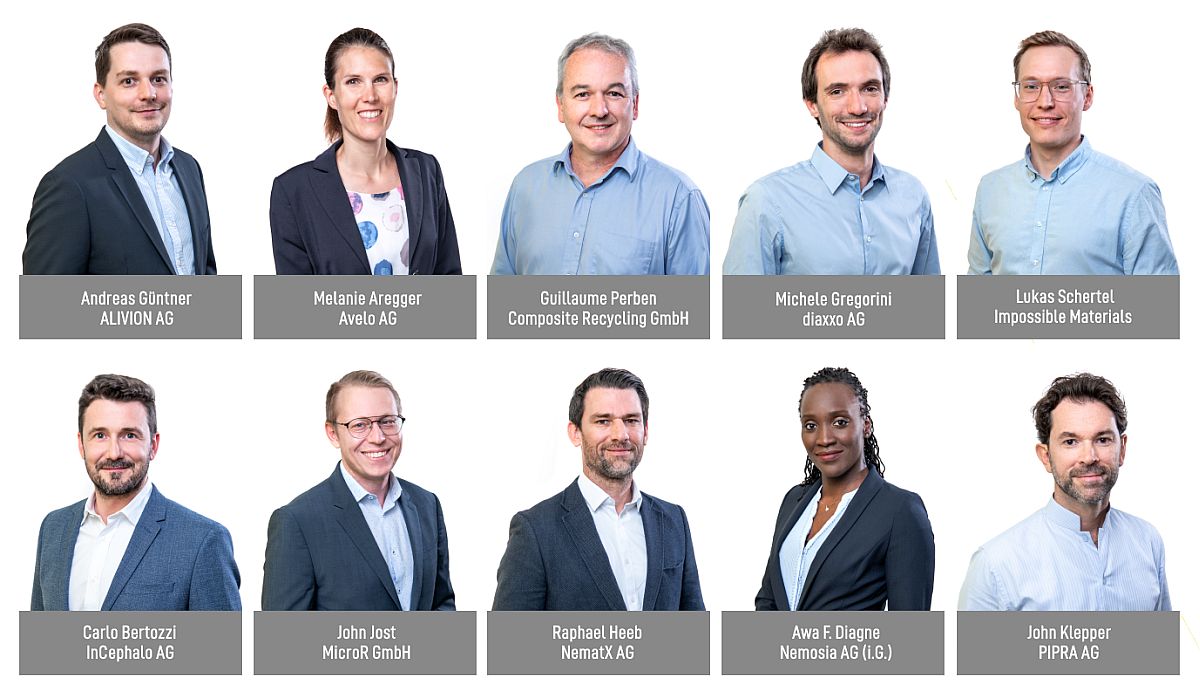
The jury has selected the ten startups to contest in the W. A. de Vigier finale. They will present their solutions at the award finale where up to six startups will be crowned winners and each bestowed with a CHF 100’000 cheque. Severin Schwan, the CEO of Roche will deliver his keynote during the ceremony.
This year’s W. A. de Vigier Award competition takes place for the first time under the leadership of Hanna Byland and Carmen Lamparter. From over 200 submitted projects, the jury picked their Top 16 in February and now the top ten most outstanding companies stand a chance to stand on one of the six winners spots. The winners will each receive a CHF 100’000 cash prize.
These are the Top 10
ALIVION from Menzingen (ZG) – Equipping Electronics With a Sense of Smell
ALIVION provides mobile chemical sensing devices that can trace single molecules by leveraging its revolutionary Molecule Select™ technology based on breakthroughs in nanotechnology at ETH Zürich. The portable gas sensors offer great value in the areas of healthcare (breath analysis), environmental monitoring, occupational and food safety through the detection of relevant molecules.
Avelo from Schlieren (ZH) –Saving Lives With Breath Aerosol Diagnostics
developed breath collector, a non-invasive and novel tool enabling doctors to collect a patient’s breath sample at the point-of-care and analyse it with existing PCR tests. With the results, doctors can select the right treatment, better manage the patient in their office, and only refer severe cases to the hospital. This improves patient outcomes, saves healthcare costs, and avoids unnecessary prescription of antibiotics.
Composite Recycling from Ecublens (VD): Closing the Loop on Composites Recycling
In partnership with the Advanced Composite Lab of the EPFL, the startup has developed a sustainable solution to separate the glass fibers from the resin of composites waste and reuse them to make new composites. No more toxic gases from incineration, no more landfilling, but rather “closing the loop” by reusing these versatile materials repeatedly.
diaxxo from Zurich(ZH) - Rapid and affordable PCR-based HPV testing
Cervical cancer, mainly caused by HPV infection, is the second most common cancer among women and a leading cause of cancer-related deaths in low- and middle-income countries, where screening tests and treatments are not readily available. diaxxo’s rapid PCR test provides high-quality diagnostics for HPV in less than 30 minutes and at an affordable cost. This solution could be the key to establishing widespread screening in low- and middle-income countries, which could significantly reduce the mortality rate.
Impossible Materials from Fribourg (FR) – Plant-Based White Pigments that are non Cancerogenic
Titanium dioxide is used as a white pigment in paints, inks, cosmetics, pharmaceuticals, and food. However, this ingredient poses health and environmental hazards, and it is being banned in food. Fribourg based startup Impossible Materials develops patented brilliantly white pigments from cellulose – a material that is renewable, widely available, cheap, biocompatible, and easy to process. The company’s pigments can be scaled with industry-proven processes, are safe for humans and don’t harm the planet.
InCephalo from Allschwil (BL) – Treating Aggressive Brain Tumors With Less Side Effects
Less than 1% of the IV administered drugs actually make it to the brain. Even when applied directly into the brain, these biological drugs rapidly leave the brain and start accumulating in the body. InCephalo's compartment locked technology (CLock) creates for the first time tailor-made biological drugs for local treatment of the brain. The CLocked drugs stay in the desired compartment, and if they leak, they are rapidly degraded. This significantly reduces the drugs’ overall exposure to the body and allows for a higher local dosing window.
MicroR from Lausanne (VD) – Lasers to Provide Ultra High Data Rates
MicroR developed multicolor lasers for high-capacity data transmission and optical computing based on a technology called “microcombs“. One microcomb can replace hundreds of high-quality lasers used in today’s optical communications while being up to 10x more energy efficient and enabling 30x higher data transmission rates at the same device size.
NematX from Zurich (ZH) – High-Performance Polymer 3D Printing
ETH spinoff NematX offers an industrial 3D printing solution based on novel liquid crystal polymers including a tailored manufacturing technology to combine highest part performance and manufacturing precision in polymer 3D printing. Customers benefit from up to 80% lower costs, three times faster delivery times, and fully recyclable materials.
Nemosia from Winterthur (ZH) – Early Diagnosis of Neurodegenerative Diseases. Nemosia’s PET neuroimaging solution is able to detect neurodegenerative diseases already at the sub-clinical stage and supports researchers in developing and monitoring therapies. Reduced diagnostic time, effective drug development and personalized treatments are just a few advantages this technology can bring to our aging society.
PIPRA from Zurich (ZH) – AI-Based Test to Assess Risk of Cognitive Disorders After Surgery
Postoperative delirium (POD) is a severe cognitive complication occurring in 20% of surgical patients aged 60+. There are no treatments once symptoms arise. Instead, the focus is on prophylactic interventions, which are too costly to offer every patient. PIPRA developed an AI-based preoperative risk prediction software that identifies patients who are most at risk and will benefit from targeted prophylactic intervention, thereby improving patient outcomes and saving costs for hospitals.
(Press release/RAN)
























































Please login or sign up to comment.
Commenting guidelines